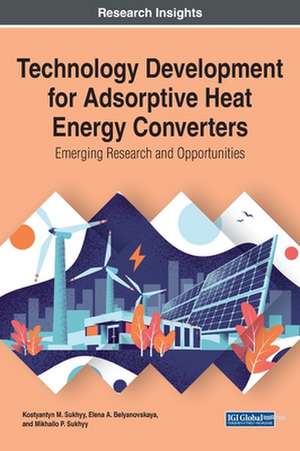Technology Development for Adsorptive Heat Energy Converters
Autor Kostyantyn M. Sukhyy, Elena A. Belyanovskaya, Mikhailo P. Sukhyyen Limba Engleză Hardback – 20 sep 2020
| Toate formatele și edițiile | Preț | Express |
|---|---|---|
| Paperback (1) | 913.45 lei 6-8 săpt. | |
| Engineering Science Reference – 21 sep 2020 | 913.45 lei 6-8 săpt. | |
| Hardback (1) | 1190.30 lei 6-8 săpt. | |
| Engineering Science Reference – 20 sep 2020 | 1190.30 lei 6-8 săpt. |
Preț: 1190.30 lei
Preț vechi: 1545.84 lei
-23% Nou
Puncte Express: 1785
Preț estimativ în valută:
227.79€ • 236.47$ • 189.94£
227.79€ • 236.47$ • 189.94£
Carte tipărită la comandă
Livrare economică 24 martie-07 aprilie
Preluare comenzi: 021 569.72.76
Specificații
ISBN-13: 9781799844327
ISBN-10: 1799844323
Pagini: 332
Dimensiuni: 183 x 260 x 22 mm
Greutate: 0.79 kg
Editura: Engineering Science Reference
ISBN-10: 1799844323
Pagini: 332
Dimensiuni: 183 x 260 x 22 mm
Greutate: 0.79 kg
Editura: Engineering Science Reference
Descriere
Offers a cohesive examination of methods of energy storage and conversion. Highlighting a broad range of topics, including composite materials, operating principles, and structural characteristics, this book is designed for developers, policymakers, researchers, academics, students, and engineers.
